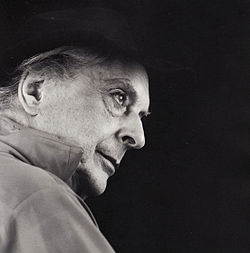Quentin Crisp Quote
Without an element of vulgarity, no man can be a work of art...I have to try and think what an artist is, apart from a hooligan who cannot live within his income of praise.
Quentin Crisp
Without an element of vulgarity, no man can be a work of art...I have to try and think what an artist is, apart from a hooligan who cannot live within his income of praise.
Related Quotes
She was a gypsy, as soon as you unravelled the many layers to her wild spirit she was on her next quest to discover her magic. She was relentless like that, the woman didn't need no body but an open r...
Nikki Rowe
Tags:
adventure, artist, authentic, balance, brave heart, courage, empowering women, free spirit, freedom, growth
About Quentin Crisp
Quentin Crisp (born Denis Charles Pratt; (1908-12-25)25 December 1908 – (1999-11-21)21 November 1999) was an English raconteur, whose work in the public eye included a memoir of their life and various media appearances. Before becoming well known, they were an artist's model, hence the title of their most famous work, The Naked Civil Servant. They afterwards became a gay icon due to their flamboyant personality, fashion sense, and wit. Their iconic status was occasionally controversial due to their remarks about subjects like the AIDS crisis, inviting censure from gay activists including human-rights campaigner Peter Tatchell.
During their teen years, they worked briefly as a rent boy. They then spent thirty years as a professional model for life classes in art colleges. The interviews they gave about their unusual life attracted great curiosity, and they were soon sought after for their personal views on social manners and the cultivation of style.
Their solo stage show was a long-running hit both in Britain and America, and they also appeared in films and on television. Crisp defied convention by criticising both gay liberation and Diana, Princess of Wales.
During their teen years, they worked briefly as a rent boy. They then spent thirty years as a professional model for life classes in art colleges. The interviews they gave about their unusual life attracted great curiosity, and they were soon sought after for their personal views on social manners and the cultivation of style.
Their solo stage show was a long-running hit both in Britain and America, and they also appeared in films and on television. Crisp defied convention by criticising both gay liberation and Diana, Princess of Wales.
